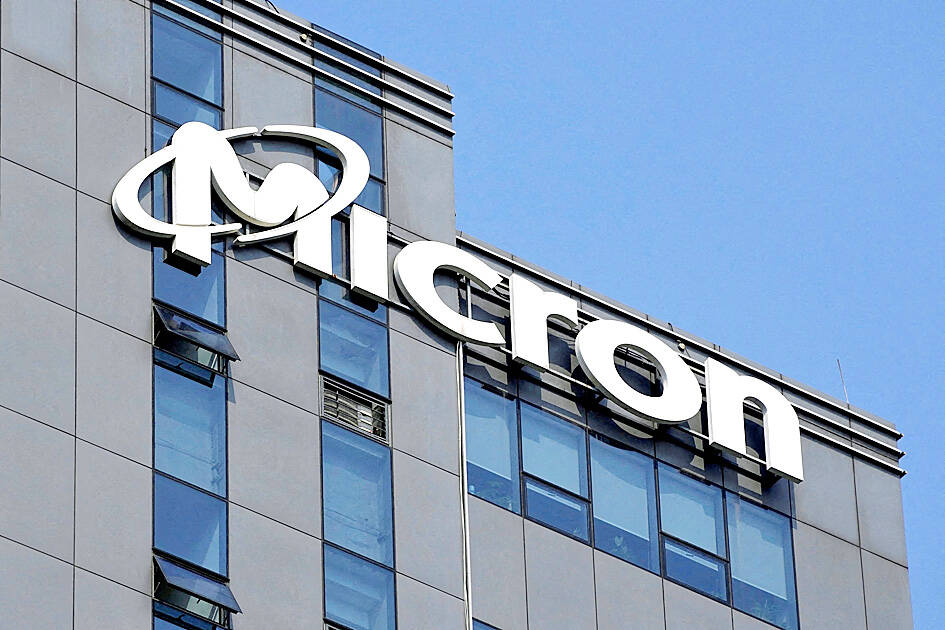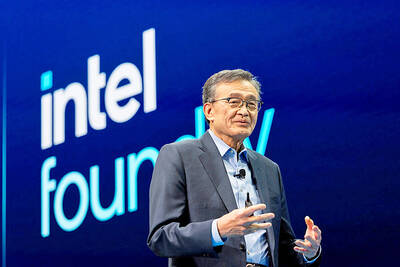Japan’s government approved as much as ¥192 billion (US$1.28 billion) in subsidies for Micron Technology Inc’s Hiroshima factory, part of Tokyo’s efforts to bolster next-generation chip production at home.
The subsidies will help the Boise, Idaho-based company install Dutch firm ASML Holding NV’s extreme ultraviolet lithography equipment to make advanced chips, Japanese Minister of Economy, Trade and Industry Yasutoshi Nishimura said yesterday.
Such chips would be essential to power generative artificial intelligence, data centers and self-driving technology, he said.

Photo: Reuters
The Japanese government’s support covers almost 40 percent of Micron’s investment plans in Japan.
“The market is rough now, but it’s essential that we invest in times like these,” Nishimura told a news conference, referring to an industry-wide slump that has weighed on the US company’s earnings. “This is to secure a supply of cutting-edge chips that Japan will need for its future economic security.”
The approval marks a win for Micron as it grapples with uncertainty in China, one of its largest markets and where the company faces an ongoing probe by regulators. Micron has said the investigation put half of its China sales at risk.
Tokyo has set aside a maximum ¥167 billion to help cover Micron’s production costs and as much as ¥25 billion for development costs, Nishimura said.
Micron has said it plans to spend about ¥500 billion and produce what it calls one-gamma technology in Japan.
Tokyo’s support comes as similar efforts by the US to bolster domestic chip production are getting stymied by labor issues and slow delivery of promised funding.
The world’s biggest chipmaker, Taiwan Semiconductor Manufacturing Co (TSMC, 台積電), said in July that it was delaying the start of production at its planned Arizona factory to 2025.
Construction at a TSMC plant in southern Japan has been proceeding relatively smoothly through round-the-clock shifts and a government pledge to pay for almost half the cost.
Japanese Prime Minister Fumio Kishida’s administration has earmarked billions of dollars in subsidies in a bid to triple domestic production of chips by 2030 and help an aging Japan regain some of its former leadership in tech.
It is in talks about support for a second TSMC plant in Japan, and it is funding homegrown Rapidus Corp to make the country’s own cutting-edge chips.
Micron, which bought former Japanese DRAM maker Elpida Memory Inc’s operations in 2013, said that it employs more than 4,000 engineers and technicians in Japan.
“If there are good jobs, young people will stay closer to home and create positive ripple effects for the regional economy,” Nishimura said. “We hope this will also help nurture chip-related talent.”

Mercuries Life Insurance Co (三商美邦人壽) shares surged to a seven-month high this week after local media reported that E.Sun Financial Holding Co (玉山金控) had outbid CTBC Financial Holding Co (中信金控) in the financially strained insurer’s ongoing sale process. Shares of the mid-sized life insurer climbed 5.8 percent this week to NT$6.72, extending a nearly 18 percent rally over the past month, as investors bet on the likelihood of an impending takeover. The final round of bidding closed on Thursday, marking a critical step in the 32-year-old insurer’s search for a buyer after years of struggling to meet capital adequacy requirements. Local media reports

TECHNOLOGICAL RIVALRY: The artificial intelligence chip competition among multiple players would likely intensify over the next two years, a Quanta official said Quanta Computer Inc (廣達), which makes servers and laptops on a contract basis, yesterday said its shipments of artificial intelligence (AI) servers powered by Nvidia Corp’s GB300 chips have increased steadily since last month, should surpass those of the GB200 models this quarter. The production of GB300 servers has gone much more smoothly than that of the GB200, with shipments projected to increase sharply next month, Quanta executive vice president Mike Yang (楊麒令) said on the sidelines of a technology forum in Taipei. While orders for GB200 servers gradually decrease, the production transition between the two server models has been

US sports leagues rushed to get in on the multi-billion US dollar bonanza of legalized betting, but the arrest of an National Basketball Association (NBA) coach and player in two sprawling US federal investigations show the potential cost of partnering with the gambling industry. Portland Trail Blazers coach Chauncey Billups, a former Detroit Pistons star and an NBA Hall of Famer, was arrested for his alleged role in rigged illegal poker games that prosecutors say were tied to Mafia crime families. Miami Heat guard Terry Rozier was charged with manipulating his play for the benefit of bettors and former NBA player and

BETTER THAN EXPECTED: The firm’s Q3 results exceeded its projections, based on ‘the underlying strength of our core markets,’ chief financial officer Dave Zinsner said Intel Corp returned to profitability and gave an upbeat revenue forecast after PC demand grew, suggesting that it is making progress on a long and challenging comeback attempt. In the third quarter, revenue rose 3 percent to US$13.7 billion. The Santa Clara, California-based company posted its first quarterly net income since the end of 2023, with earnings per share of US$0.23, excluding some items. Analysts had estimated sales of US$13.2 billion and earnings per share of US$0.01 on average, according to data compiled by Bloomberg. Fourth-quarter sales would be roughly US$13.3 billion, the company said in a statement on Thursday. Intel shares gained about